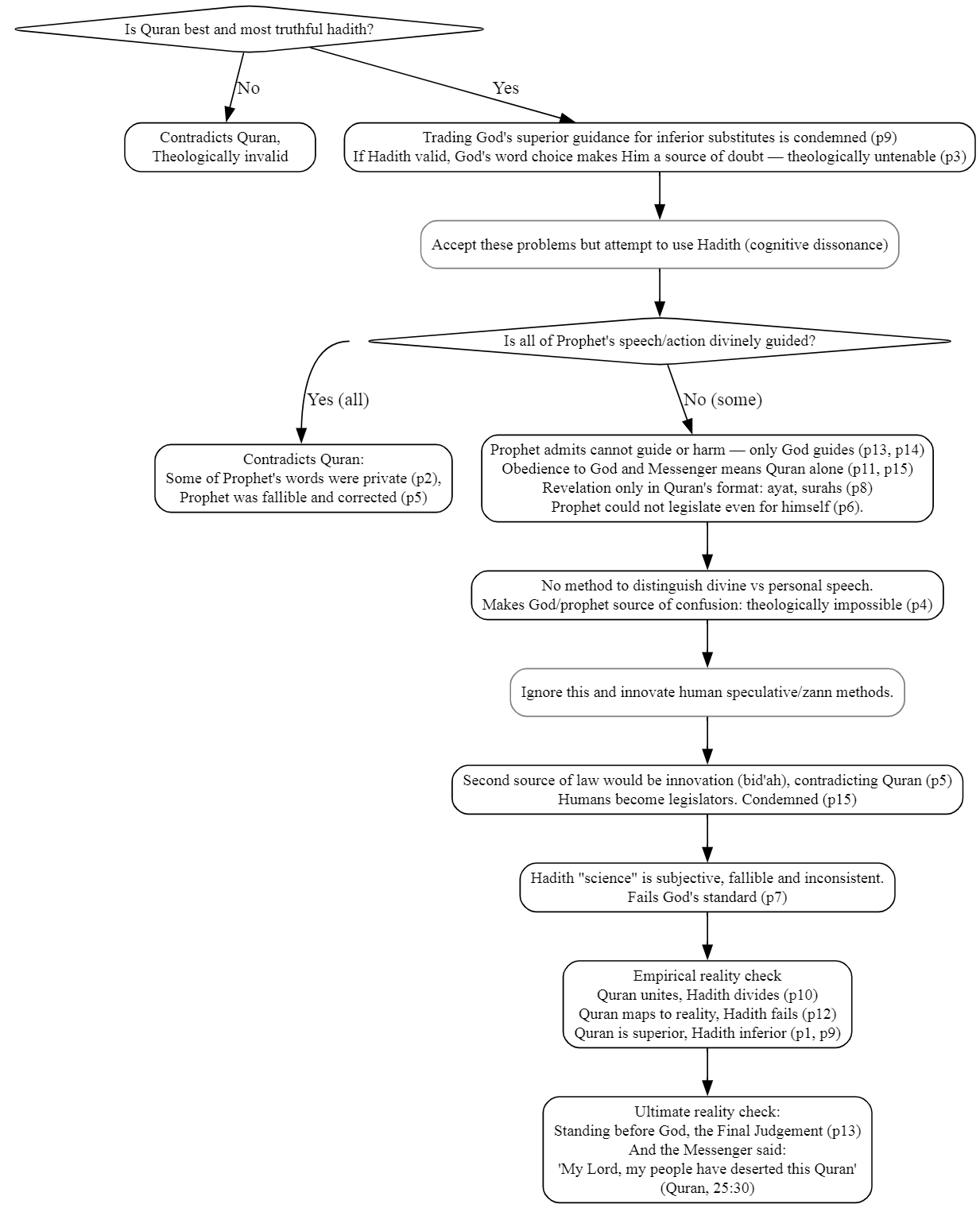
www.QuranVsHadith.com ©
HOME :: Supplement
1: Summary with Flow
Chart
1. Qur’an's usage of
Hadith
Never used to endorse prophet's hadith. God is more truthful in
hadith and has revealed the best hadith.
This means all other man-made hadith are by definition less
truthful and of lesser quality. How can the inferior be used to
supplement or complete the superior?
2. Not All Prophetic
Speech Was Divine Guidance
Companions asked not to linger for hadith and wives rebuked for
spreading it. Therefore, not everything the prophet said was
revelation for us.
3. God’s Word Choice
Matters
If Hadith were meant to be followed, God would not have used the
word *hadith* in ways that cast doubt or rejection on it. To
believe otherwise is to claim God deliberately sowed confusion,
which is theologically untenable.
4. No Method to
Distinguish Divine from Personal
Neither the Qur’an nor the prophet left any method to identify
which of his sayings were divine guidance and which were
personal. This would mean God/prophet left the community in
confusion, again theologically untenable.
5. The Prophet Was
Fallible
The Qur’an shows the
prophet was corrected, proving not everything he did was
divinely guided. Since he was no innovator among messengers
(46:9), we face a forced choice:
* If he innovated a secondary source of law, this contradicts
the Qur’an.
* If he did not innovate, this refutes the authority of hadith
as independent law.
6. Prophet Could Not
Legislate
Qur’an 66:1 shows the prophet could not even prohibit things for
himself. It is therefore logically and theologically untenable
that he could legislate for the entire community outside the
Qur’an.
7. Hadith fails Quranic
standard
There is no authorisation for, nor divine criterion for Hadith
methodology. One of God’s standards for divine revelation is
non-contradiction (4:82). No matter how rigorous human systems
of hadith verification are, they cannot rival God’s standard.
Since hadith are not authorised, divinely vetted and riddled
with inaccuracies/contradictions, they fail the Qur’an’s own
test for truth.
8. Form of Revelation
is Only Qur’an
The Qur’an defines revelation as coming only in the form of ayat
and surahs. Since prophetic hadith are not in this form, they
cannot be revelation.
9. Trading the Better
for the Lesser
The Qur’an condemns exchanging God’s superior guidance for
lesser substitutes. Replacing or supplementing the Qur’an with
hadith is precisely such an exchange — which the Qur’an itself
criticizes.
10. God’s Guidance
Unites, Man-made Words Divide
The Qur’an emphasizes that divine guidance brings unity, while
false guidance creates division. History shows the Qur’an unites
while hadith aids sectarian splits — proof that hadith is
man-made misguidance.
11. Authority Is One,
Not Two
The Qur’an’s phrase “obey God and the messenger” is undeniably a
single obedience through one source. To interpret it as two
separate authorities produces absurdities: two jihads, two
migrations, two treaties, two piles of spoils. The only coherent
reading is unity of obedience.
12. One Source of Law
The Qur’an establishes that unconditional authority lies solely
with the rasūl in his role as the conveyor of divine revelation,
while a nabi’s actions may be morally instructive but not
legally binding in the same way. As a result, the dual-source
premise underlying the hadith-based legal system collapses, and
even perfectly preserved nabi reports cannot constitute an
independent, binding source of divine law.
13. Reality Check Test
The Qur’an instructs believers to test truth against reality
(41:53). The Qur’an passes this test; hadith does not.
Therefore, hadith fails one of the Qur’an’s verification
mechanisms.
14. Prophet Admits He
Cannot Guide
The prophet himself admitted he cannot harm or guide. Serving or
obeying such is condemned in the Qur’an. By extension, making
his alleged hadith an authority is condemned at its very core.
15. God Guides
Directly
God, who needs no guidance and is the sole guide, is more worthy
of following than a fallible human who himself needs guidance.
Thus, the Qur’an condemns reliance on hadith as a secondary
source of guidance. Hadith is zann/speculation, which is
condemned, and its use disallowed.
16. Qur’an Declares
Itself Complete
The Qur’an repeatedly affirms it is clear, complete, detailed
and contains every necessary example. To claim it needs
supplementation by hadith contradicts the Qur’an directly and
undermines its authority.
